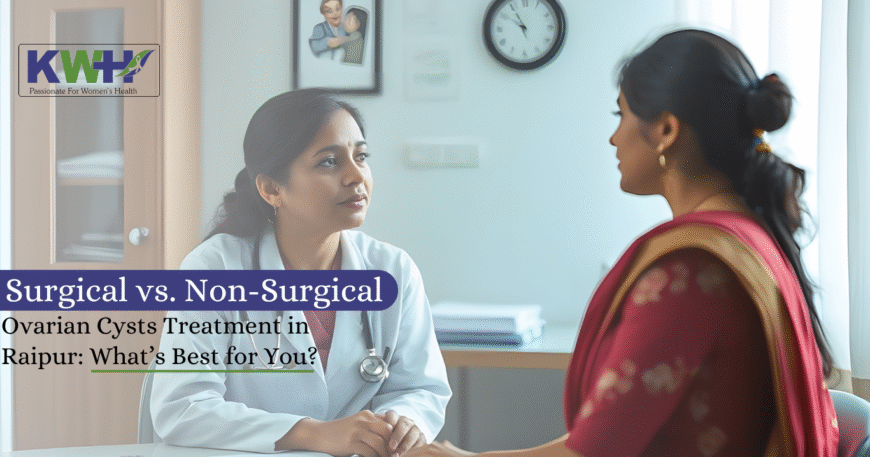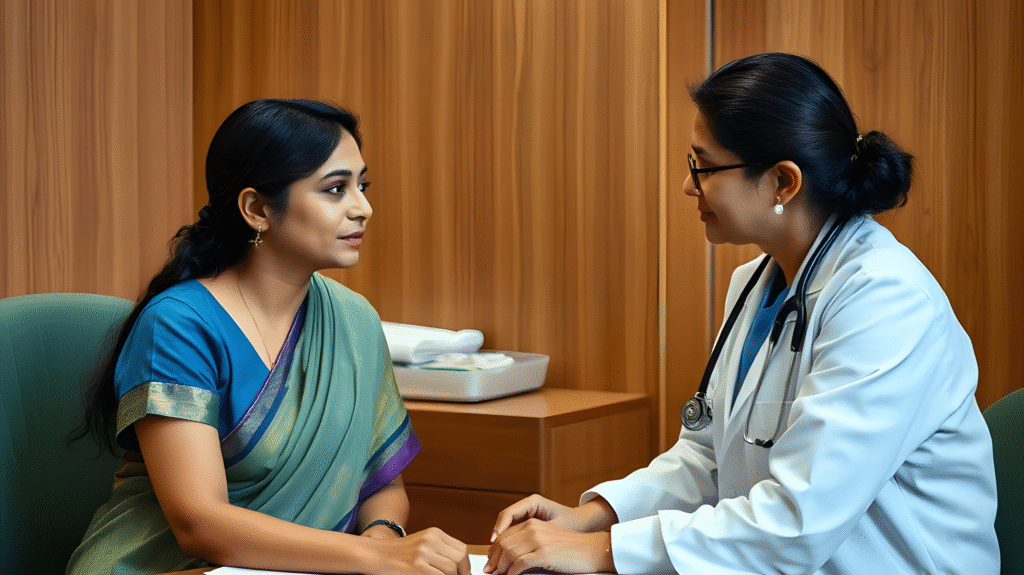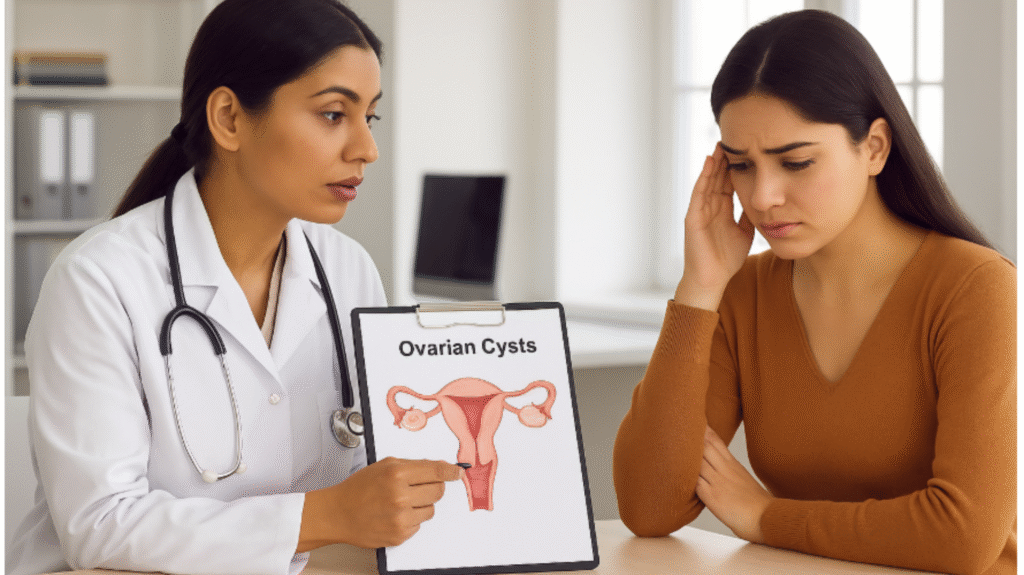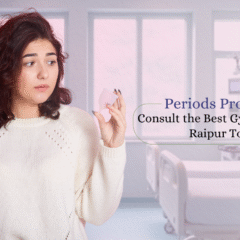
Surgical vs. Non-Surgical Ovarian Cysts Treatment in Raipur: What’s Best for You?
Ovarian cysts are a common health concern for women, affecting many at some point in their lives. Whether small and asymptomatic or large and symptomatic, ovarian cysts can be a source of discomfort and worry. Fortunately, with modern medicine, there are effective ways to treat ovarian cysts, and the treatment options fall primarily into two categories: surgical and non-surgical.
If you’re living in Raipur and wondering which treatment option is best for you, you’ve come to the right place. This blog will break down the differences between surgical and non-surgical ovarian cyst treatment in Raipur, helping you understand which approach may be the most effective based on your individual circumstances. From the importance of consulting the best doctor for ovarian cysts treatment in Raipur to understanding how to choose the right treatment path, we’ll cover it all.

Understanding Ovarian Cysts
Before diving into treatment options, let’s take a moment to understand ovarian cysts and why they need treatment.
Ovarian cysts are fluid-filled sacs that form on or inside the ovaries. While many cysts are harmless and may resolve on their own, others can cause problems like:
- Pain: Severe or persistent pelvic pain.
- Irregular Menstrual Cycles: Some cysts affect your hormonal balance, leading to irregular periods.
- Reproductive Issues: Large cysts may affect fertility.
The symptoms of ovarian cysts can range from mild to severe. For example, you may experience bloating, painful intercourse, or urinary issues. When cysts are large or cause persistent problems, they may need medical intervention, either through surgery or non-surgical treatments.
Non-Surgical Ovarian Cysts Treatment in Raipur
For many women, non-surgical treatment is the first option to manage ovarian cysts. This approach is typically considered when cysts are smaller, causing few symptoms, or are not expected to pose significant risk.
1. Observation and Monitoring
If you have a small, functional cyst that is causing no pain or symptoms, your doctor may recommend a “wait-and-see” approach. In many cases, these cysts resolve on their own without the need for intervention. This is the most common non-surgical option, especially for women who are experiencing minimal symptoms.
Real-World Example: A patient in Raipur recently visited a best women hospital in Raipur complaining of mild pelvic discomfort. After an ultrasound, it was found that she had a small functional cyst. Her doctor advised monitoring the cyst with follow-up ultrasounds, and after a few months, it had naturally shrunk and disappeared, without any further complications.
2. Medication
Hormonal birth control pills, patches, or IUDs can be prescribed to regulate menstrual cycles and prevent the formation of new cysts. Birth control pills can also help in reducing the size of existing cysts. While medication is not always a cure, it can help manage symptoms and reduce the likelihood of cyst recurrence.
For women who are not trying to conceive, this can be an effective method for controlling ovarian cysts.
Example: Many women with PCOS (Polycystic Ovary Syndrome), which often leads to multiple cysts on the ovaries, find relief through birth control medications prescribed by their gynecologists. The medication helps balance hormones and control cyst formation.
3. Pain Management
If your cysts are causing discomfort but are not severe enough to require surgery, over-the-counter pain relievers like ibuprofen or acetaminophen can help. For more persistent or severe pain, your doctor might suggest stronger pain medications or anti-inflammatory drugs.
However, it’s essential to keep in mind that pain management is more about symptom control and not a long-term solution to the underlying cyst.
Tip: Always consult a best doctor for ovarian cysts treatment in Raipur to ensure you’re using the right medications and not just masking the symptoms.
4. Natural Remedies
Some women opt for natural remedies to manage their ovarian cysts. Although there is limited scientific evidence to support these methods, practices like a balanced diet, stress management, and herbal teas are commonly used to manage symptoms.
It’s important to remember that natural remedies should be used in conjunction with medical advice, and it’s always best to consult a professional before pursuing them.

Surgical Ovarian Cysts Treatment in Raipur
While non-surgical treatments are often the first line of defense, surgery may be necessary when cysts cause significant symptoms, pose a risk of complications, or are suspected to be cancerous. There are several surgical options available, depending on the size, type, and severity of the cysts.
1. Laparoscopy (Minimally Invasive Surgery)
Laparoscopy is a minimally invasive surgery used to remove cysts. This procedure involves small incisions through which a tiny camera and surgical instruments are inserted. It’s typically used to remove cysts that are small to medium-sized and not attached to the ovaries. One of the main benefits of laparoscopy is that recovery time is much shorter compared to traditional surgery.
Real-World Example: A patient in Raipur was diagnosed with a large ovarian cyst that caused painful bloating and discomfort. After consulting with a best doctor for ovarian cysts treatment in Raipur, she underwent laparoscopy. The cyst was removed successfully, and she was able to return to her normal activities within a week.
2. Laparotomy (Traditional Surgery)
In cases where the cyst is large, complex, or suspected to be cancerous, your doctor may recommend laparotomy, a more invasive surgical procedure. This involves a larger incision to access the ovaries and remove the cyst. Although the recovery time is longer, this procedure allows for a more thorough examination and removal of larger cysts.
Tip: If you’re considering surgery, always seek advice from the best doctor for ovarian cysts treatment in Raipur to ensure you fully understand the risks and benefits of your options.
3. Oophorectomy (Ovary Removal)
In some extreme cases, especially if a cyst is cancerous or if there are recurring cysts, your doctor may recommend removing the affected ovary (oophorectomy). This is usually a last resort when other options have failed or when the cyst is causing serious health issues.
While the removal of an ovary may impact fertility, many women are still able to conceive with one healthy ovary. This option is typically considered when the cysts are large, persistent, or cancerous.
What’s Best for You? Deciding Between Surgical and Non-Surgical Treatment
Choosing between surgical and non-surgical ovarian cysts treatment in Raipur depends on several factors, including:
- The size, type, and symptoms of the cyst
- Whether the cyst is causing pain or affecting your daily life
- Your reproductive goals and age
- The risk of complications like cancer or rupture
Factors to Consider:
- Age and Fertility: If you are still trying to conceive, surgery may be avoided, or the least invasive procedure (like laparoscopy) may be preferred.
- Cyst Size and Type: Small, functional cysts often respond well to non-surgical treatments, while larger cysts or cysts with complex features may require surgery.
- Symptom Severity: If you have frequent pain or other significant symptoms, surgery might provide more long-term relief.
Consult the Experts
Before making a decision, it’s crucial to consult with a best doctor for ovarian cysts treatment in Raipur. A specialist will conduct an in-depth evaluation, including ultrasounds, hormone tests, and possibly a biopsy, to help determine the best course of action.

Conclusion: Take Charge of Your Health with the Right Treatment
Whether you opt for surgical or non-surgical ovarian cysts treatment in Raipur, it’s important to take action and seek the appropriate care as soon as symptoms appear. By doing so, you’ll be able to address the issue before it causes further complications, preserving your health and fertility.
If you’re looking for a trusted place for ovarian cysts treatment, Kamla Women’s Hospital in Raipur is one of the leading institutions offering comprehensive care. With a team of experienced gynecologists and surgeons, Kamla Women’s Hospital provides personalized treatment options that cater to your unique health needs. Their approach combines advanced medical technology with compassionate care, ensuring that you receive the best possible outcomes. Don’t wait until your symptoms worsen—schedule a consultation with a best doctor for ovarian cysts treatment in Raipur at Kamla Women’s Hospital today. Early treatment is key to your overall well-being!
FAQs
1. When should I consider surgery for ovarian cysts?
Surgery is typically considered when cysts are large, cause severe symptoms, or are suspected to be cancerous.
2. How can I prevent ovarian cysts?
While there’s no guaranteed prevention, using birth control pills and maintaining a healthy lifestyle may help reduce the risk of developing ovarian cysts.
3. Can ovarian cysts affect my ability to get pregnant?
In most cases, ovarian cysts don’t impact fertility, but large or persistent cysts may require treatment to avoid affecting your chances of conception.
4. How long does it take to recover from ovarian cyst surgery?
Recovery time varies depending on the type of surgery. Laparoscopy usually requires 1-2 weeks for recovery, while traditional surgery may take 4-6 weeks.
5. How do I find the best doctor for ovarian cyst treatment in Raipur?
Look for experienced gynecologists and hospitals with a strong reputation, such as Kamla Women’s Hospital, known for its expert care in women’s health.
Ready to take control of your ovarian health? Reach out to Kamla Women’s Hospital for expert care and guidance today!





